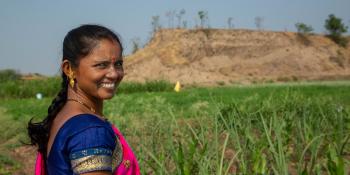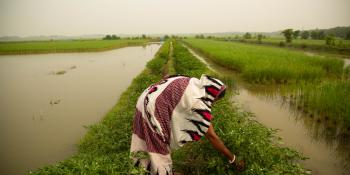Climate information services in Senegal: Ensuring their sustainability

How to perpetuate the use of climate information services among the Senegalese farmers, breeders and fishermen communities?
In Senegal, climate change is already a major threat to the farming, herding and fishing communities. Low and irregular rainfall is likely to jeopardize the livelihoods of millions of people in these areas. Faced with such a situation, it has become essential to know the weather and climate forecasts in the key sectors and sub-sectors of agriculture.
In search of effective responses to support the growth of the agriculture sector, USAID / Senegal funded a project called Climate Information Services for Increasing Resilience and Productivity in Senegal (USAID / CINSERE). This project started in 2016 and is coordinated by CCAFS / ICRISAT in partnership with the National Agency of Civil Aviation and Meteorology of Senegal (ANACIM)
A proven positive impact with agricultural producers in Senegal
Since the official launch of its activities in 2016, the USAID / CINSERE project has achieved convincing results:
- 4,188 producers were trained directly on access, use of weather and climate information services (WCIS) as well as index insurance,
- 1,044 fishermen were trained in access and use of WCIS,
- Over 193,000 individuals (50% of whom are women) had direct access to WCIS,
- 174,000 producers were sensitized to the use of climate information services,
- 65 demonstration fields have been set up and thousands of people have accessed climate information through community radios, Facebook and Whatsapp, and
- 308 agents of the technical services of the Senegalese State receive meteorological and climatic information by email
Following these successful achievements and the rapid adoption of WCIS by beneficiaries, it was deemed necessary to conduct days of reflection on the sustainability of WCIS.
On March 11, 12 and 13, 2019, the project actors and stakeholders addressed the issue through a workshop on the sustainability of the use of WCIS in Senegal. Discussions focused mainly on an efficient scaling of climate related technologies and practices in Senegal via an institutionalization of weather and climatic information services with the aim of improving the resilience of agricultural producers, breeders and fishermen. It was also an opportunity to simultaneously acquire new knowledge and learn lessons based on various experience.
The USAID / CINSERE project has enabled farmers to adapt their activities according to weather and climate conditions. These results have not only allowed them to secure their agricultural investments, but also to optimize them through a certain degree of mitigation (risk mitigation) in decision-making.
David Janggeen, Country Director (USAID / Senegal)
Depending on the weather information we receive, we are able to program our semi and spreading dates. For example, if I put fertilizer on a rainy day, I am likely to lose it since the water runoff could take everything away. Thanks to the information received in the form of alerts, we manage to make our arrangements in good time.
Anna Gaye, a farmer from the Kolda region, Senegal
This USAID / CINSERE review allowed us to hear very edifying testimonies from producers. Through these testimonies, we can say that climate information has become an agricultural input.
Dr. Mamadou Goudiaby, National Director of Fisheries of Senegal
Read more:
Dansira Dembélé is the Communications Officer for CCAFS West Africa.



